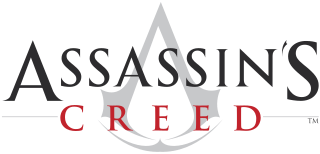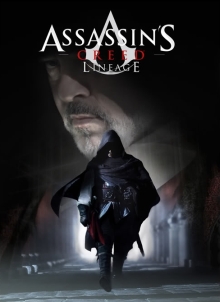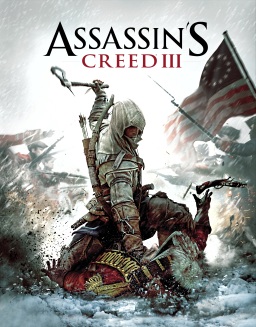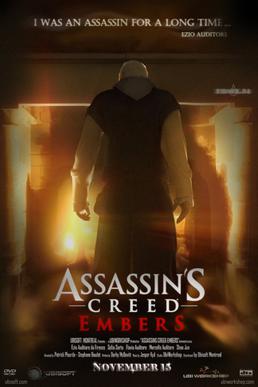
Assassin's Creed II is a 2009 action-adventure game developed by Ubisoft Montréal and published by Ubisoft. It is the second major installment in the Assassin's Creed series, and the sequel to 2007's Assassin's Creed. The game was first released on the PlayStation 3 and Xbox 360 in November 2009, and was later made available on Microsoft Windows in March 2010 and OS X in October 2010.

Assassin's Creed is a historical action-adventure video game series and media franchise published by Ubisoft and developed mainly by its studio Ubisoft Montreal using the game engine Anvil and its more advanced derivatives. Created by Patrice Désilets, Jade Raymond, and Corey May, the Assassin's Creed video game series depicts a fictional millennia-old struggle between the Order of Assassins, who fight for peace and free will, and the Knights Templar, who desire peace through order and control. The series features historical fiction, science fiction, and fictional characters intertwined with real-world historical events and historical figures. In most games, players control a historical Assassin while also playing as an Assassin Initiate or someone caught in the Assassin–Templar conflict in the present-day framing story. Considered a spiritual successor to the Prince of Persia series, Assassin's Creed took inspiration from the novel Alamut by the Slovenian writer Vladimir Bartol, based on the historical Hashashin sect of the medieval Iran (Persia).

Assassin's Creed II: Discovery is a 2009 action-adventure side-scrolling video game developed by Griptonite Games and published by Ubisoft. It was released for the Nintendo DS in November 2009, and for the iOS operating system in January 2010. Part of the Assassin's Creed series, it is a spin-off to Assassin's Creed II and is set during that game's events, between Sequences 12 and 13. The story takes place from 1491 to 1492, and follows Ezio Auditore da Firenze as he travels to Spain to help his fellow Assassins, who are being hunted by the Templar Order under the guise of the Spanish Inquisition.

Assassin's Creed: Lineage is a series of three Canadian short films based on the Assassin's Creed video game series, directed by Yves Simoneau. The films are made by Ubisoft Montreal in collaboration with Hybride Technology, and mark Ubisoft's first attempt to step into the film industry. The three short films were released on YouTube to promote Assassin's Creed II, to which they serve as a prequel, describing the history of Ezio Auditore da Firenze and his family before the events of the game. The films primarily revolve around Ezio's father Giovanni, an Assassin from 15th-century Florence, and his investigation of the mysterious murder of the Duke of Milan, Galeazzo Maria Sforza, which leads him to confront a larger conspiracy.

Ezio Auditore da Firenze is a fictional character in the video game series Assassin's Creed, serving as the principal protagonist of the series' games set during the Italian Renaissance. An Italian Master Assassin, his life and career as an Assassin are chronicled in Assassin's Creed II, II: Discovery, Brotherhood (2010), and Revelations (2011), as well as the short films Assassin's Creed: Lineage (2009), Ascendance (2010), and Embers (2011) and various spin-off media of the franchise. In 2016, all three major games featuring Ezio, as well as Lineage and Embers, were re-released as an enhanced bundle titled Assassin's Creed: The Ezio Collection. Throughout most of his appearances, the character has been voiced by American actor Roger Craig Smith, while Canadian actor Devon Bostick portrayed him in live-action in Lineage.

Assassin's Creed III is a 2012 action-adventure game developed by Ubisoft Montreal and published by Ubisoft. It is the fifth major installment in the Assassin's Creed series, and a direct sequel to 2011's Assassin's Creed Revelations. The game was released worldwide for PlayStation 3 and Xbox 360, beginning in North America on October 30, 2012, with a Wii U and Microsoft Windows release in November 2012. A remastered version of the game was released in 2019 for Windows, PlayStation 4, Xbox One and Nintendo Switch, and in 2021 for Google Stadia.

Assassin's Creed: Brotherhood is a 2010 action-adventure game developed by Ubisoft Montreal and published by Ubisoft. It is the third major installment in the Assassin's Creed series, and the second chapter in the "Ezio Trilogy", as a direct sequel to 2009's Assassin's Creed II. The game was first released on the PlayStation 3 and Xbox 360 in November and December 2010 and was later made available on Microsoft Windows in March and June 2011. A remastered version of Brotherhood, along with Assassins's Creed II and its sequel, Assassin's Creed: Revelations, was released as part of The Ezio Collection compilation for the PlayStation 4 and Xbox One on November 15, 2016, and for the Nintendo Switch on February 17, 2022.

Assassin's Creed: The Fall is an American comic book three-issue mini-series published by WildStorm. Set in the Assassin's Creed universe, it tells the story of Nikolai Orelov, a member of the Russian Brotherhood of Assassins, who battles Templar influence in Russia in the late 19th and early 20th centuries. The miniseries also features a framing story, taking place from 1998 to 2000, which follows Nikolai's descendant Daniel Cross as he explores his ancestor's genetic memories while trying to learn more about his own past and the history of the Assassins.

Assassin's Creed Revelations is a 2011 action-adventure game developed by Ubisoft Montreal and published by Ubisoft. It is the fourth major installment of the Assassin's Creed series, and a direct sequel to 2010's Assassin's Creed: Brotherhood, concluding the "Ezio Trilogy". The game was released on PlayStation 3, Xbox 360, and Microsoft Windows in November and December 2011. A remastered version of Revelations, along with Assassin's Creed II and Brotherhood, was released as part of The Ezio Collection compilation for the PlayStation 4 and Xbox One on November 15, 2016, and for the Nintendo Switch on February 17, 2022.
Assassin's Creed: Ascendance, originally named Secret Project Number Three, is an animated short by UbiWorkshop and Ubisoft Montreal, which bridges the gap between Assassin's Creed II and Assassin's Creed: Brotherhood. It was revealed by UbiWorkshop on November 10, 2010, and released on November 16, 2010, for Xbox Live, PlayStation Store and iTunes Store.

Assassin's Creed: Embers is a 2011 Canadian animated short film created by UbiWorkshop, based on the Assassin's Creed video game franchise. It serves as a conclusion to the story of Ezio Auditore da Firenze, the protagonist of Assassin's Creed II, Brotherhood, and Revelations, who has also featured in several other works. Taking place in 1524, twelve years after the events of Revelations, the film depicts an elderly Ezio living a peaceful life with his family in rural Tuscany after retiring from the Assassin Order, until the appearance of a mysterious Assassin threatens to put his family in danger.
The Assassin's Creed series is a collection of novels by various authors, set within the fictional universe of the Assassin's Creed video game franchise created by Ubisoft. The books are set across various time periods and, like the games, revolve around the secret war fought for centuries between the Assassin Brotherhood and the Templar Order. The series includes both direct novelizations of several Assassin's Creed games, and books that function as standalone narratives, although some of these tie-in with one or more of the games in the franchise. British publishing house Penguin Books was responsible for the publication of most of the novels in the series, as well as their respective audiobook versions, until 2020, when Aconyte Books took over as the main publisher of the series.

Ratonhnhaké:ton, commonly known by his adopted name Connor, is a fictional character in the video game series Assassin's Creed. A half-British, half-Mohawk Master Assassin who serves as a central character in the games set around the American Revolution, he first appears as the main protagonist of Assassin's Creed III (2012), in which he is portrayed by Native American actor Noah Watts through performance capture, and voiced by Jamie Mayers as a young child. He also makes a minor appearance in the tie-in game Assassin's Creed III: Liberation. The character has made further appearances in various spin-off media of the franchise.

Assassin's Creed: Brahman is a graphic novel published by UbiWorkshop in October 2013. Set in the Assassin's Creed universe, it tells the story of Arbaaz Mir, a member of the Indian Brotherhood of Assassins during the 19th century, who fights the increasing influence and occupation of the East India Company while also clashing with the Assassins' longtime enemies, the Templar Order. The framing story, set in 2013, follows programmer Jot Soora, who becomes caught in the Assassin-Templar conflict when his fiancée, Monima Das, is revealed to be a descendant of Arbaaz possessing genetic memories that can help both the Assassins and Templars locate a powerful artifact.

Assassin's Creed Unity is a 2014 action-adventure game developed by Ubisoft Montreal and published by Ubisoft. It was released in November 2014 for PlayStation 4, Windows, and Xbox One, and in December 2020 for Stadia. It is the eighth major installment in the Assassin's Creed series, and the successor to 2013's Assassin's Creed IV: Black Flag. It also has ties to Assassin's Creed Rogue, which was released for the previous generation consoles on the same day as Unity.

Assassin's Creed Rogue is a 2014 action-adventure game developed by Ubisoft Sofia and published by Ubisoft. It is the seventh major installment in the Assassin's Creed series, and is set between 2012's Assassin's Creed III and 2013's Assassin's Creed IV: Black Flag. It also has ties to Assassin's Creed Unity, which was released on the same day as Rogue. It is the last Assassin's Creed game to be developed for the seventh generation of consoles, being released for PlayStation 3 and Xbox 360 in November 2014 and for Windows in March 2015. A remastered version of the game was released for PlayStation 4 and Xbox One in March 2018. It was also released on the Nintendo Switch as part of The Rebel Collection alongside Black Flag in December 2019 and for Google Stadia in October 2021.

Assassin's Creed Chronicles is a sub-series of video games in the Assassin's Creed franchise. The series consists of three games developed by Climax Studios and published by Ubisoft. The games feature new protagonists and settings and a design that is new to the series: 2.5D environments inspired by traditional brush paintings. The first entry, Assassin's Creed Chronicles: China, was released on April 21, 2015, for Microsoft Windows, PlayStation 4 and Xbox One. It was followed by Assassin's Creed Chronicles: India and Assassin's Creed Chronicles: Russia on January 12, 2016, and February 9, 2016, respectively. A collection comprising all three games was released on February 9, 2016, for the same platforms, and on April 5, 2016, for the PlayStation Vita.
Assassin's Creed, also known as Assassin's Creed: Assassins, is a comic book series published by Titan Comics. Set in the fictional universe of Ubisoft's Assassin's Creed video game series, the comic follows the same premise as the games, involving a millennia-old struggle between the Assassin Brotherhood, who fight for peace and freedom, and the Templar Order, who believe in peace through control, to decide the fate of humanity. The comic is primarily set in the modern-day and follows the adventures of Charlotte de la Cruz, a banker who is recruited into the Assassins and partakes in their fight against the Templars. Through the use of a machine called the Animus, Charlotte also occasionally relives the genetic memories of her ancestors at various points in history to acquire skills and information needed to complete her missions.
The Assassin's Creed series has a collection of print publications by various authors, set within the fictional universe of the Assassin's Creed video game franchise created by Ubisoft. The publications are set across various time periods and revolve around the secret war fought for centuries between the Assassin Brotherhood and the Templar Order. It includes collections such as novels, artworks, comic books and a audiobook. British publishing house Penguin Books was responsible for most of the publications.














